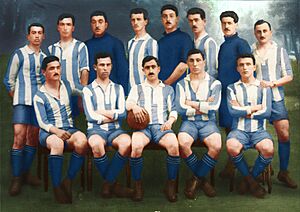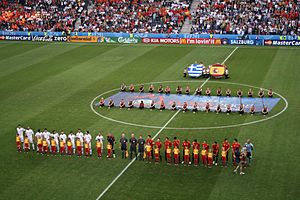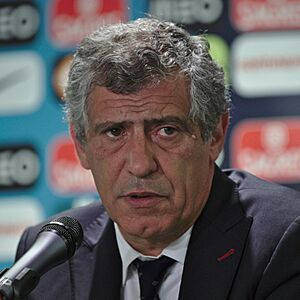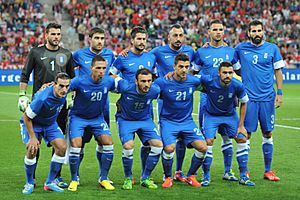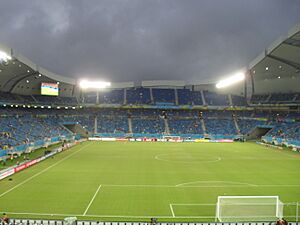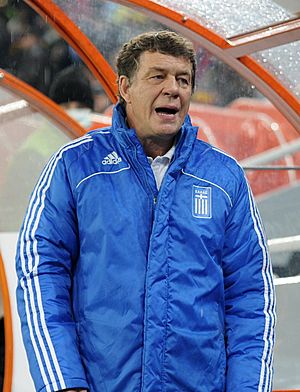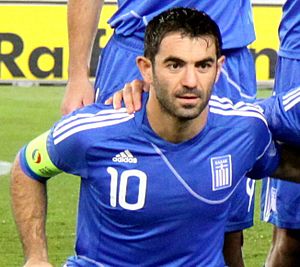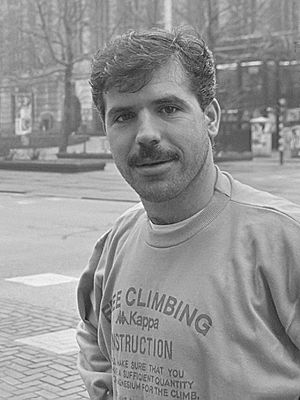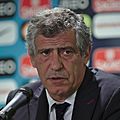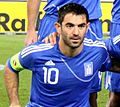Greece national football team facts for kids
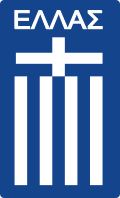 |
||||||||||||||||||||||||||||||||||||||||||||
| Nickname(s) | Ethniki (The National) Galanolefki (The Azure & White) Piratiko (The Pirate Ship) |
|||||||||||||||||||||||||||||||||||||||||||
|---|---|---|---|---|---|---|---|---|---|---|---|---|---|---|---|---|---|---|---|---|---|---|---|---|---|---|---|---|---|---|---|---|---|---|---|---|---|---|---|---|---|---|---|---|
| Association | Hellenic Football Federation (HFF) (Ελληνική Ποδοσφαιρική Ομοσπονδία – ΕΠΟ) |
|||||||||||||||||||||||||||||||||||||||||||
| Confederation | UEFA (Europe) | |||||||||||||||||||||||||||||||||||||||||||
| Head coach | Ivan Jovanović | |||||||||||||||||||||||||||||||||||||||||||
| Captain | Anastasios Bakasetas | |||||||||||||||||||||||||||||||||||||||||||
| Most caps | Giorgos Karagounis (139) | |||||||||||||||||||||||||||||||||||||||||||
| Top scorer | Nikos Anastopoulos (29) | |||||||||||||||||||||||||||||||||||||||||||
| Home stadium | Karaiskakis Stadium | |||||||||||||||||||||||||||||||||||||||||||
| FIFA code | GRE | |||||||||||||||||||||||||||||||||||||||||||
|
||||||||||||||||||||||||||||||||||||||||||||
| FIFA ranking | ||||||||||||||||||||||||||||||||||||||||||||
| Current | 45 |
|||||||||||||||||||||||||||||||||||||||||||
| Highest | 8 (April 2008, October 2011) | |||||||||||||||||||||||||||||||||||||||||||
| Lowest | 66 (September 1998) | |||||||||||||||||||||||||||||||||||||||||||
| Elo ranking | ||||||||||||||||||||||||||||||||||||||||||||
| Current | 55 |
|||||||||||||||||||||||||||||||||||||||||||
| Highest | 7 (August 2004) | |||||||||||||||||||||||||||||||||||||||||||
| Lowest | 78 (May 1963, November 1963) | |||||||||||||||||||||||||||||||||||||||||||
| First international | ||||||||||||||||||||||||||||||||||||||||||||
(Piraeus, Greece; 7 April 1929) |
||||||||||||||||||||||||||||||||||||||||||||
| Biggest win | ||||||||||||||||||||||||||||||||||||||||||||
(Athens, Greece; 25 November 1949) |
||||||||||||||||||||||||||||||||||||||||||||
| Biggest defeat | ||||||||||||||||||||||||||||||||||||||||||||
(Budapest, Hungary; 25 March 1938) |
||||||||||||||||||||||||||||||||||||||||||||
| World Cup | ||||||||||||||||||||||||||||||||||||||||||||
| Appearances | 3 (first in 1994) | |||||||||||||||||||||||||||||||||||||||||||
| Best result | Round of 16 (2014) | |||||||||||||||||||||||||||||||||||||||||||
| European Championship | ||||||||||||||||||||||||||||||||||||||||||||
| Appearances | 4 (first in 1980) | |||||||||||||||||||||||||||||||||||||||||||
| Best result | Champions (2004) | |||||||||||||||||||||||||||||||||||||||||||
| Olympic Games | ||||||||||||||||||||||||||||||||||||||||||||
| Appearances | 3 (first in 1920) | |||||||||||||||||||||||||||||||||||||||||||
| Best result | Group stage (2004) | |||||||||||||||||||||||||||||||||||||||||||
| Confederations Cup | ||||||||||||||||||||||||||||||||||||||||||||
| Appearances | 1 (first in 2005) | |||||||||||||||||||||||||||||||||||||||||||
| Best result | Group stage (2005) | |||||||||||||||||||||||||||||||||||||||||||
|
Medal record
|
||||||||||||||||||||||||||||||||||||||||||||
| Website | epo.gr | |||||||||||||||||||||||||||||||||||||||||||
The Greece national football team represents Greece in international men's football games. It is managed by the Hellenic Football Federation. Greece is one of only ten national teams to have won the UEFA European Championship.
Greece first played in a big tournament at UEFA Euro 1980. They were knocked out in the group stage. This placed them among the top eight European football nations that year. Greece did not qualify for another major tournament until the 1994 FIFA World Cup. After a great qualifying run, they did not perform well in the finals, losing all three group matches without scoring.
UEFA Euro 2004 was the best moment in Greece's football history. They won the tournament in only their second try. Many people thought they had no chance before the tournament. But Greece beat strong teams like defending champions France and hosts Portugal twice. They defeated Portugal in the opening game and again in the final. This win earned them a spot in the 2005 FIFA Confederations Cup.
In the ten years after their 2004 victory, Greece qualified for almost every major competition. They reached the quarter-finals at UEFA Euro 2012 and the round of 16 at the 2014 FIFA World Cup. During this time, they were often in the top 20 of the FIFA Men's World Rankings. They even reached their highest rank of eighth in the world in April 2008 and October 2011.
Since 2014, Greece has not played in the finals of any major tournament.
Contents
- History of Greek Football
- Home Stadiums of Greece
- Team Look and Nicknames
- Recent Matches and Schedule
- Coaching Staff
- Current Players
- Player Records
- Team Achievements
- Images for kids
- See also
History of Greek Football
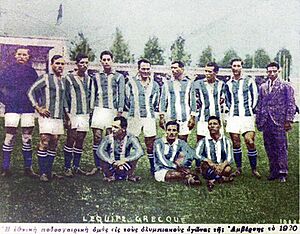
Early Football Matches
On 12 April 1896, a Greek team played against a Denmark XI in Athens. They lost by a large score in a special game during the 1896 Olympic Games.
The first few Olympic football events (1900–06) were not official for national teams. Only a few club teams played. Greece hosted the 1906 Olympics. A team from Athens played against a Danish club and two teams from the Ottoman Empire. In the final, the Athens team was losing badly and stopped playing at halftime.
Greece's next unofficial game was 13 years later at the Inter-Allied Games in Paris in 1919. They lost their first two games by big scores. But they managed to beat Romania 3–2 in their last match. The next year, Greece played in the 1920 Summer Games in Antwerp. They lost 9–0 to Sweden in the first round. This game is recognized by FIFA as their first official match.
The Greece national team's first official match was on 7 April 1929. They lost 1–4 to Italy B. Alberto Nahmias scored Greece's first official goal.
Balkan and Mediterranean Cups
Between 1929 and 1936, Greece played in six Balkan Cups. Their best result was finishing second in the 1934–35 Balkan Cup. They were just one point behind Yugoslavia. Kostas Choumis was a key player, scoring 7 goals in the Balkan Cup.
From 1949 to 1958, Greece played in three Mediterranean Cups. They finished second in the 1950–53 Mediterranean Cup, just one point behind Italy B. Georgios Darivas was the top scorer in that edition with 4 goals.
In 1951, Greece won the first Mediterranean Games men's football tournament. This was held in Alexandria, Egypt. They beat Syria and hosts Egypt to win the title. Nikos Lekatsas was the star, scoring 4 goals.
World Cup Near Misses in the 1970s
In the decades after World War II, Greece did not have much international success in football. The country's economic and social situation made it hard to develop a strong national team.
Greece almost qualified for the FIFA World Cup twice. These were in 1970 and 1978. They had good players like Mimis Domazos and Giorgos Sideris during these years.
Euro 1980 Debut
Greece made its first appearance in a major tournament at the Euro 1980 in Italy. They qualified by finishing first in a tough group. This group included strong teams like the Soviet Union and Hungary. In the tournament, Greece was in Group A with West Germany, the Netherlands, and Czechoslovakia.
In their first game, Greece lost 1–0 to the Netherlands. Three days later, they lost 3–1 to Czechoslovakia. In their last game, Greece earned a 0–0 draw against West Germany, who went on to win the tournament. This was seen as a good performance for their first time in a major competition.
Struggles Before 1994
Greece did not qualify for six major tournaments after Euro 1980. These included three World Cups and three Euros. During this time, Greece often played poorly. However, they did have some surprising good results. These included a draw against Italy in 1982 World Cup qualifiers. They also had a 3–2 win over Hungary and a 0–0 draw against England in Euro 1984 qualifiers.
Greece struggled to score goals and their defense was often disorganized. This led to them losing important games and failing to qualify.
1994 World Cup Experience
The team qualified for the 1994 FIFA World Cup in the United States. This was their first time reaching the World Cup finals. Greece finished first and undefeated in their qualifying group. They beat Russia in the final game to secure their spot.
In the tournament, Greece was in Group D with Nigeria, Bulgaria, and Argentina. People in Greece had high hopes after the successful qualifying campaign. However, the team performed very poorly. They lost all three games, scoring no goals and letting in ten. This was a tough learning experience for the team.
Near Misses After 1994
Greece did not qualify for UEFA Euro 1996, finishing third in their group. In the 1998 World Cup qualifiers, they missed out by just one point. They finished behind Croatia, who went on to do very well in that World Cup.
For Euro 2000 qualifiers, Greece again finished third. They were two points behind Slovenia. In the 2002 World Cup qualifiers, Greece finished fourth. This led to a change in coach, with Otto Rehhagel taking over.
European Champions: Euro 2004 Triumph
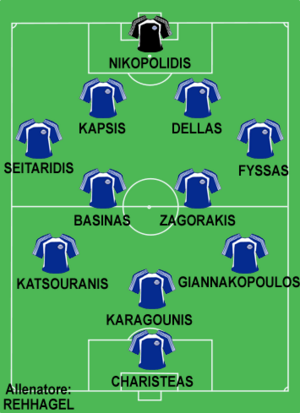

Qualifying for Euro 2004
Greece started their UEFA Euro 2004 qualifying games with two losses. They lost 2–0 at home to Spain and away to Ukraine. But then, the team won all of their next six games. This included a 1–0 win over Spain in Zaragoza. This amazing comeback secured their first-place finish in the group. It also meant they would play in the European Championship finals for the first time in 24 years.
Before the Tournament
Greece was considered one of the least likely teams to win the tournament. Many saw them as underdogs. They were placed in Group A, which was called a "group of death." It included hosts Portugal, Spain, and Russia. Very few people thought Greece would even make it past the group stage.
Group Stage Success
In the first match against hosts Portugal, Greece won 2–1. This was a big surprise! They earned the nickname "pirate ship" (Το Πειρατικό). Giorgos Karagounis scored from far away, and Angelos Basinas scored a penalty. Four days later, Greece drew 1–1 with Spain. They were down 1–0 at halftime but Angelos Charisteas scored to tie the game. In their last group match, Greece was losing 2–0 to Russia early on. But Zisis Vryzas scored, and Greece moved on to the next round because they had scored more goals than Spain.
Quarter-finals Victory
In the quarter-finals, Greece played against the undefeated champions, France. In the 65th minute, Greece took the lead. Captain Theodoros Zagorakis made a great play, and Angelos Charisteas scored with a header. Greece held on to win, even though France attacked strongly at the end. They became the first team to beat both the hosts and the defending champions in the same tournament.
Semi-finals Thriller
Greece reached the semi-finals to face the Czech Republic. The Czechs had won all their games so far. They were expected to win the trophy. The game was very tense. The Czech Republic attacked a lot, but Greece's goalkeeper Antonios Nikopolidis made many saves. A key Czech player, Pavel Nedvěd, got injured in the first half. The game ended 0–0 after 90 minutes. In the last minute of the first half of extra time, Traianos Dellas scored a "silver goal" with a header from a corner kick. This sent Greece to the final!
Euro 2004 Final
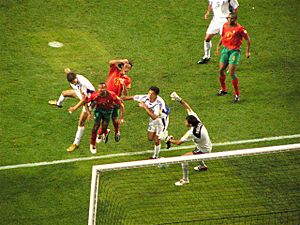
For the first time, the final was a repeat of the opening match. Greece and hosts Portugal played each other again. In the 57th minute, Charisteas scored with a header from a corner by Angelos Basinas. Portugal had a lot of the ball, but Greece's defense was very strong. Cristiano Ronaldo had a chance to score late in the game, but he missed. Greece won 1–0, winning the tournament! Many people call this one of the biggest upsets in football history. Greece captain Zagorakis was named the best player of the tournament.
Recognition for the Champions
Greece's victory made them jump from 35th to 14th in the FIFA World Rankings in just one month. This was a huge jump! Winning Euro 2004 is the biggest team sports achievement in Greece's history. The team was honored with medals and a huge celebration. They were also named "World Team of the Year" at the 2005 Laureus World Sports Award for Team of the Year.
After the Euro 2004 Win
2005 Confederations Cup
As European champions, Greece played in the 2005 FIFA Confederations Cup in Germany. They were in a group with 2002 FIFA World Cup champions Brazil, 2004 AFC Asian Cup champions Japan, and 2003 CONCACAF Gold Cup champions Mexico. Greece lost their first two matches and drew their last one, finishing last in the group.
Euro 2008 Campaign
Greece was a top seed for the UEFA Euro 2008 qualifying tournament. They won their qualifying group with 31 points, which was the most points of any team. This secured their spot in the Euro 2008 finals.
In the tournament, Greece was in Group D with Sweden, Spain, and Russia. Greece lost all three of their games and scored only one goal. They became the first defending champion not to earn any points in the next European Championship.
2010 World Cup Journey
Greece qualified for the 2010 FIFA World Cup after beating Ukraine in a playoff. This was their second World Cup appearance. They were grouped with Argentina and Nigeria, who they had also played in 1994. South Korea was the other team in their group.
Greece lost their first game 2–0 to South Korea. In their second game against Nigeria, Greece won 2–1. This was their first-ever World Cup victory! Dimitris Salpingidis scored Greece's first World Cup goal. Vasilis Torosidis scored the winning goal. In their third match against Argentina, Greece lost 2–0. They finished third in their group and did not move on.
After the 2010 World Cup, Otto Rehhagel stepped down as coach. Fernando Santos became the new manager. Under Santos, Greece went on an amazing 17-game unbeaten streak. They also moved up to eighth in the FIFA world rankings, matching their highest-ever position.
Euro 2012 Performance
Greece qualified for UEFA Euro 2012 without losing a single game in their qualifying group. This was the second time they had done this for a major tournament. They often scored late goals, especially from defenders.
In the tournament, Greece was in Group A with hosts Poland, Russia, and the Czech Republic. In their opening match against Poland, Greece drew 1–1. They played with ten men for much of the game. In their second match, Greece lost 2–1 to the Czech Republic. In their final group game, Greece needed to win against Russia to advance. They won 1–0 with a goal from captain Giorgos Karagounis. This sent them to the quarter-finals for the second time.
Euro 2012 Quarter-finals
In the quarter-finals, Greece played against Germany. Germany had won all their group matches. Germany scored first, but Georgios Samaras equalized for Greece. However, Germany then scored three more goals quickly. Greece scored a late penalty, but the match ended 4–2 to Germany. This ended Greece's Euro 2012 journey.
2014 World Cup Journey
To reach the 2014 FIFA World Cup in Brazil, Greece played in a tough qualifying group. They finished second behind Bosnia and Herzegovina. Greece's defense was very strong, letting in only four goals in ten games.
Greece then played Romania in a two-game playoff. Greece won 4–2 on total goals, with Kostas Mitroglou scoring three goals. This sent Greece to the World Cup.
2014 World Cup Finals
Greece was in Group C with Colombia, Côte d'Ivoire, and Japan. In their first game, they lost 3–0 to Colombia. In their second game, Greece drew 0–0 with Japan, even though their captain Kostas Katsouranis received two yellow cards and was sent off.
In their final group match, Greece needed to beat Ivory Coast to reach the next round. Andreas Samaris scored Greece's first goal. Ivory Coast equalized, but in the last minute of the game, Georgios Samaras scored a penalty kick. This gave Greece a 2–1 win and sent them to the Round of 16 for the first time in their history!
In the Round of 16, Greece played Costa Rica. Costa Rica had surprisingly won their group. Greece was losing 1–0, but Sokratis Papastathopoulos scored a goal in the last seconds to force extra time. The game went to a penalty shootout, where Costa Rica won 5–3. This ended Greece's best World Cup run.
Recent Years: 2014 Onwards
Euro 2016 and 2018 World Cup Qualifiers
After 2014, Greece had a difficult period. They appointed Claudio Ranieri as coach, but he was soon replaced after a shocking home defeat to the Faroe Islands. Greece finished last in their Euro 2016 qualifying group and did not qualify.
For the 2018 FIFA World Cup qualifiers, Greece showed some improvement. They finished second in their group behind Belgium. However, they lost to Croatia in the playoff round and did not qualify for the World Cup.
Nations League and Euro 2020 Qualifiers
Greece played in League C of the UEFA Nations League. They finished third in their group. For UEFA Euro 2020 qualifiers, Greece finished third in their group. The team showed improvement in their attacking style in their final games.
2022 World Cup Qualifiers
Greece remained in League C for the 2020–21 Nations League. They needed a win against Slovenia in their last game to get promoted but drew 0–0. They finished unbeaten and only conceded one goal.
For the 2022 FIFA World Cup qualifiers, Greece started with a good 1–1 draw against Spain. They had some draws and wins, but eventually lost to Sweden and Spain. This meant Greece did not qualify for the World Cup for the second time in a row.
Euro 2024 Qualifiers and Nations League Promotion
Under coach Gus Poyet, Greece had a good run in the 2022–23 UEFA Nations League. They won their group and earned promotion to League B. This also gave them a playoff spot for Euro 2024.
In the Euro 2024 qualifiers, Greece finished third in their group. They then played in the playoffs. They won easily against Kazakhstan (5–0) in the semi-final. However, they lost to Georgia on penalties in the final after a 0–0 draw. So, they did not qualify for Euro 2024.
Recent Success: Nations League Promotion
Greece started their new UEFA Nations League campaign under coach Ivan Jovanović. On 10 October 2024, they surprised England by beating them 2–1 at Wembley Stadium. Vangelis Pavlidis scored both goals for Greece.
Greece finished second in their group, which earned them a spot in the promotion playoffs against Scotland. In the first game on 20 March 2025, Greece lost 0–1 at home. However, in the second game on 23 March 2025, Greece won 3–0 away from home! This meant they won 3–1 on total goals and earned their first-ever promotion to League A of the Nations League. Young players like Giannis Konstantelias, Konstantinos Karetsas, and Christos Tzolis were key to this victory.
Home Stadiums of Greece
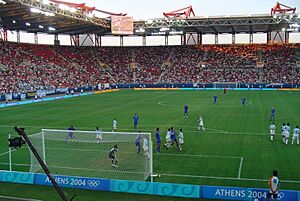
Greece has played its home matches in many different stadiums over the years. Most of these stadiums are in or near Athens.
The Karaiskakis Stadium in Piraeus was the main home ground from 2004 until 2017. It became the national venue again in 2024. Before that, the Leoforos Alexandras Stadium in Athens was used regularly for 33 years, starting in 1929.
Other stadiums like Kaftanzoglio Stadium in Thessaloniki and the Athens Olympic Stadium have also hosted many games. The Athens Olympic Stadium is the largest in Greece and was the main home ground during the 1980s and 1990s.
In 2023, the new Agia Sophia Stadium in Athens was announced as the national team's new home. However, for the 2024 Nations League, Greece returned to the Karaiskakis Stadium.
Team Look and Nicknames
Greece's traditional colors are blue and white, just like the Greek flag. Blue was the main home color for a long time. But after UEFA Euro 2004, white became the main home color. The team usually wears either all white or all blue uniforms.
On 10 April 2013, the Hellenic Football Federation announced that Nike would be their official uniform supplier. Their first Nike uniform was used on 7 June 2013. The team's crest, called εθνόσημο (national sign), is the official symbol on their uniforms.
Team Nicknames
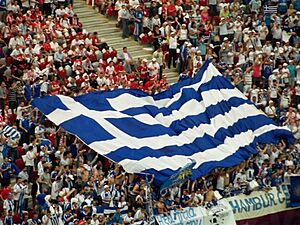
The Greek national team is often called Ethniki (Εθνική) by the media and people in Greece. This simply means 'National'. They are also called Galanolefki (Sky blue-white) because of their uniform colors, which come from the Greek flag. These nicknames are used for other Greek national sports teams too.
During the opening ceremony of UEFA Euro 2004, a replica of an old ship was used. A Greek sports journalist joked that Greece should become "pirates" and "steal the victory." Greece then won the opening game against Portugal. After that, the team was called Piratiko, meaning the 'Pirate ship'. This nickname became very popular, especially after Greece won the Euro 2004 final. It celebrates their amazing win as European champions.
Rivalries with Other Teams
Greece has a long-standing rivalry with Turkey. They have played 13 matches, with Greece winning three, drawing three, and losing seven. Both teams are known for surprising people with their success. This rivalry is very strong because of historical reasons and past incidents between clubs from both countries.
Greece also has a rivalry with Romania. They have played 36 matches. Greece has won 8, Romania has won 18, and 10 matches have been draws.
Recent Matches and Schedule
The following lists Greece's match results from the last 12 months and any upcoming games.
Win Draw Loss Fixture
2024 Matches
| 7 September 2024 2024–25 UEFA Nations League B – Group 2 | Greece |
3–0 | Piraeus, Greece | |
| 21:45 UTC+3 | Stadium: Karaiskakis Stadium Attendance: 17,293 Referee: Urs Schnyder (Switzerland) |
| 10 September 2024 2024–25 UEFA Nations League B – Group 2 | Republic of Ireland |
0–2 | Dublin, Ireland | |
| 19:45 UTC+1 | Stadium: Aviva Stadium Attendance: 37,274 Referee: Espen Eskås (Norway) |
| 10 October 2024 2024–25 UEFA Nations League B – Group 2 | England |
1–2 | London, England | |
| 19:45 UTC+1 | Bellingham |
Stadium: Wembley Stadium Attendance: 79,012 Referee: Andrea Colombo (Italy) |
| 13 October 2024 2024–25 UEFA Nations League B – Group 2 | Greece |
2–0 | Piraeus, Greece | |
| 21:45 UTC+3 | Stadium: Karaiskakis Stadium Attendance: 30,253 Referee: Joey Kooij (Netherlands) |
| 14 November 2024 2024–25 UEFA Nations League B – Group 2 | Greece |
0–3 | Athens, Greece | |
| 21:45 UTC+3 | Stadium: Athens Olympic Stadium Attendance: 60,664 Referee: Daniel Siebert (Germany) |
| 17 November 2024 2024–25 UEFA Nations League B – Group 2 | Finland |
0–2 | Helsinki, Finland | |
| 19:00 UTC+2 | Stadium: Helsinki Olympic Stadium Attendance: 17,661 Referee: Willy Delajod (France) |
2025 Matches
| 20 March 2025 2024–25 UEFA Nations League promotion/relegation play-offs | Greece |
0–1 | Piraeus, Greece | |
| 21:45 UTC+2 |
|
Stadium: Karaiskakis Stadium Attendance: 31,483 Referee: Tobias Stieler (Germany) |
| 23 March 2025 2024–25 UEFA Nations League promotion/relegation play-offs | Scotland |
0–3 (1–3 agg.) |
Glasgow, Scotland | |
| 19:00 UTC+2 | Stadium: Hampden Park Attendance: 48,626 Referee: Davide Massa (Italy) |
| 7 June 2025 Friendly | Greece |
4–1 | Heraklion, Greece | |
| 21:45 UTC+3 | Stadium: Pankritio Stadium Attendance: 18,930 Referee: Harm Osmers (Germany) |
| 10 June 2025 Friendly | Greece |
4–0 | Heraklion, Greece | |
| 21:45 UTC+3 | Stadium: Pankritio Stadium Attendance: 18,000 Referee: Nathan Verboomen (Belgium) |
| 5 September 2025 2026 FIFA World Cup qualification | Greece |
v | Piraeus, Greece | |
| 21:45 UTC+3 | Stadium: Karaiskakis Stadium |
| 8 September 2025 2026 FIFA World Cup qualification | Greece |
v | Piraeus, Greece | |
| 21:45 UTC+3 | Stadium: Karaiskakis Stadium |
| 9 October 2025 2026 FIFA World Cup qualification | Scotland |
v | Glasgow, Scotland | |
| 19:45 UTC+1 | Stadium: Hampden Park |
| 12 October 2025 2026 FIFA World Cup qualification | Denmark |
v | Copenhagen, Denmark | |
| 20:45 UTC+2 | Stadium: Parken Stadium |
| 15 November 2025 2026 FIFA World Cup qualification | Greece |
v | Piraeus, Greece | |
| 21:45 UTC+2 | Stadium: Karaiskakis Stadium |
Coaching Staff
Here are the people who help manage and train the Greek national football team.
| Position | Name |
|---|---|
| Manager | |
| Assistant manager | |
| Goalkeeping coach | |
| Sporting director | |
| Sporting director | |
| Technical director |
Coaching History

This table shows all the main coaches for the national team and their results since 1929.
Updated 10 June 2025.
| Name | Greece career | Pld | W | D | L | Win % | Major competitions | |
|---|---|---|---|---|---|---|---|---|
| 1929
1934–1935 |
5 | 1 | 1 | 3 | 20% | |||
| 1929–1930 | 3 | 1 | 1 | 1 | 33.3% | |||
| 1930 | 1 | 0 | 0 | 1 | 0% | |||
| 1930–1931 | 5 | 1 | 0 | 4 | 20% | |||
| 1932 | 4 | 0 | 0 | 4 | 0% | |||
| 1933–1934
1938 1948–1950 1953 |
16 | 5 | 1 | 10 | 31.3% | |||
| 1935 | 4 | 0 | 1 | 3 | 0% | |||
| 1936 | 2 | 0 | 0 | 2 | 0% | |||
| 1938 | 1 | 0 | 0 | 1 | 0% | |||
| 1951
1952–1953 1954–1955 1958 1961 |
12 | 3 | 4 | 5 | 17% | |||
| 1951 | 1 | 1 | 0 | 0 | 100% | |||
| 1951
1954 1955 |
8 | 3 | 1 | 4 | 37.5% | |||
| 1956 | 1 | 0 | 0 | 1 | 0% | |||
| 1957–1958 | 7 | 2 | 1 | 4 | 28.6% | |||
| 1959–1960 | 5 | 1 | 0 | 4 | 20% | |||
| 1960–1961
1962–1964 |
11 | 5 | 1 | 5 | 45.5% | |||
| 1964–1965
1967 1969–1971 1976–1977 |
35 | 6 | 9 | 20 | 17.1% | |||
| 1966–1967 | 2 | 2 | 0 | 0 | 100% | |||
| 1968 | 1 | 0 | 0 | 1 | 0% | |||
| 1968–1969 | 8 | 3 | 4 | 1 | 37.5% | |||
| 1971–1973 | 12 | 2 | 3 | 7 | 16.7% | |||
| 1973–1976
1977–1981 1992–1994 |
74 | 23 | 20 | 31 | 31.1% | |||
| 1982–1984 | 21 | 5 | 3 | 13 | 23.8% | |||
| 1984–1988 | 46 | 14 | 15 | 17 | 30.4% | |||
| 1988–1989 | 7 | 3 | 1 | 3 | 42.9% | |||
| 1989–1991
1992 |
30 | 11 | 9 | 10 | 36.7% | |||
| 1992 | 1 | 0 | 0 | 1 | 0% | |||
| 1994–1998 | 34 | 17 | 6 | 11 | 50% | |||
| 1998–1999 | 7 | 4 | 2 | 1 | 57.1% | |||
| 1999–2001 | 30 | 14 | 8 | 8 | 46.7% | |||
| 2001 | 1 | 0 | 1 | 0 | 0% | |||
| 2001–2010 | 106 | 53 | 23 | 30 | 50% | |||
| 2010–2014 | 49 | 26 | 17 | 6 | 53.1% | |||
| 2014 | 4 | 0 | 1 | 3 | 0% | |||
| 2014, 2015 | 5 | 1 | 1 | 3 | 20% | |||
| 2015 | 3 | 0 | 2 | 1 | 0% | |||
| 2015–2018 | 27 | 11 | 5 | 11 | 40.7% | |||
| 2018–2019 | 7 | 2 | 1 | 4 | 28.6% | |||
| 2019–2021 | 26 | 11 | 9 | 6 | 42.3% | |||
| 2022–2024 | 22 | 12 | 4 | 6 | 54.5% | |||
| 2024 | 2 | 1 | 0 | 1 | 50% | |||
| 2024– | 10 | 8 | 0 | 2 | 80.0% | |||
| Total | 1929–present | 656 | 252 | 155 | 249 | 38.4% | ||
| Santos has the national record of 17 consecutive unbeaten games. | ||||||||
Current Players
Here are the players who were called up for the friendly matches against Slovakia on 7 June 2025 and Bulgaria on 10 June 2025.
Caps and goals are updated as of 10 June 2025, after the match against Bulgaria.
| No. | Pos. | Player | Date of birth (age) | Caps | Goals | Club |
|---|---|---|---|---|---|---|
| 1 | GK | Odysseas Vlachodimos | 26 April 1994 | 48 | 0 | |
| 12 | GK | Konstantinos Tzolakis | 8 November 2002 | 4 | 0 | |
| 13 | GK | Christos Mandas | 17 September 2001 | 2 | 0 | |
|
|
||||||
| 2 | DF | Georgios Vagiannidis | 12 September 2001 | 5 | 0 | |
| 3 | DF | Konstantinos Koulierakis | 28 November 2003 | 14 | 0 | |
| 4 | DF | Konstantinos Mavropanos | 11 December 1997 | 36 | 2 | |
| 5 | DF | Panagiotis Retsos | 9 August 1998 | 17 | 0 | |
| 15 | DF | Lazaros Rota | 23 August 1997 | 23 | 0 | |
| 17 | DF | Pantelis Chatzidiakos | 18 January 1997 | 36 | 0 | |
| 21 | DF | Kostas Tsimikas | 12 May 1996 | 41 | 0 | |
| 22 | DF | Dimitris Giannoulis | 17 October 1995 | 33 | 0 | |
|
|
||||||
| 6 | MF | Dimitrios Kourbelis | 2 November 1993 | 45 | 2 | |
| 10 | MF | Dimitrios Pelkas | 26 October 1993 | 46 | 5 | |
| 11 | MF | Anastasios Bakasetas (captain) | 28 June 1993 | 75 | 17 | |
| 16 | MF | Christos Zafeiris | 23 February 2003 | 9 | 0 | |
| 18 | MF | Giannis Konstantelias | 5 March 2003 | 13 | 4 | |
| 20 | MF | Konstantinos Karetsas | 19 November 2007 | 3 | 1 | |
| 23 | MF | Manolis Siopis | 14 May 1994 | 39 | 1 | |
| 25 | MF | Sotiris Alexandropoulos | 26 November 2001 | 10 | 0 | |
| 26 | MF | Christos Mouzakitis | 25 December 2006 | 4 | 0 | |
|
|
||||||
| 7 | FW | Georgios Masouras | 1 January 1994 | 51 | 10 | |
| 8 | FW | Fotis Ioannidis | 10 January 2000 | 17 | 6 | |
| 9 | FW | Anastasios Douvikas | 2 August 1999 | 19 | 2 | |
| 14 | FW | Vangelis Pavlidis | 21 November 1998 | 48 | 9 | |
| 19 | FW | Christos Tzolis | 30 January 2002 | 24 | 6 | |
| 24 | FW | Taxiarchis Fountas | 4 September 1995 | 19 | 1 | |
Recent Call-ups
These players have also been called up to the Greece squad in the last year.
| Pos. | Player | Date of birth (age) | Caps | Goals | Club | Latest call-up |
|---|---|---|---|---|---|---|
|
|
||||||
| DF | Andreas Ntoi | 2 February 2003 | 2 | 0 | v. |
|
|
|
||||||
| MF | Petros Mantalos | 31 August 1991 | 68 | 7 | v. |
|
| MF | Konstantinos Galanopoulos | 28 December 1997 | 9 | 1 | Unattached | v. |
| MF | Andreas Bouchalakis | 5 April 1993 | 47 | 1 | Unattached | v. |
|
|
||||||
| FW | Anastasios Chatzigiovanis | 31 May 1997 | 15 | 0 | v. |
|
|
||||||
Player Records
Here are some records for players who have played for Greece.
- Players in bold are still active with Greece.
Most Games Played
| Rank | Name | Caps | Goals | Position | Career |
|---|---|---|---|---|---|
| 1 | Giorgos Karagounis | 139 | 10 | MF | 1999–2014 |
| 2 | Theodoros Zagorakis | 120 | 3 | MF | 1994–2007 |
| 3 | Kostas Katsouranis | 116 | 10 | MF | 2003–2015 |
| 4 | Vasilis Torosidis | 101 | 10 | DF | 2007–2019 |
| 5 | Angelos Basinas | 100 | 7 | MF | 1999–2009 |
| 6 | Stratos Apostolakis | 96 | 5 | DF | 1986–1998 |
| 7 | Antonios Nikopolidis | 90 | 0 | GK | 1999–2008 |
| Sokratis Papastathopoulos | 90 | 3 | DF | 2008–2019 | |
| 9 | Angelos Charisteas | 88 | 25 | FW | 2001–2011 |
| 10 | Dimitris Salpingidis | 82 | 13 | FW | 2005–2014 |
Top Goal Scorers
| Rank | Player | Goals | Caps | Ratio | Period |
|---|---|---|---|---|---|
| 1 | Nikos Anastopoulos | 29 | 74 | 0.39 | 1977–1988 |
| 2 | Angelos Charisteas | 25 | 88 | 0.28 | 2001–2011 |
| 3 | Theofanis Gekas | 24 | 78 | 0.31 | 2005–2014 |
| 4 | Dimitris Saravakos | 22 | 78 | 0.28 | 1982–1994 |
| 5 | Mimis Papaioannou | 21 | 61 | 0.34 | 1963–1978 |
| 6 | Nikos Machlas | 18 | 61 | 0.3 | 1993–2002 |
| 7 | Demis Nikolaidis | 17 | 54 | 0.31 | 1995–2004 |
| Kostas Mitroglou | 17 | 65 | 0.26 | 2009–2019 | |
| Tasos Bakasetas | 17 | 75 | 0.23 | 2016–present | |
| 10 | Panagiotis Tsalouchidis | 16 | 76 | 0.21 | 1987–1995 |
Team Captains
This list shows the players who have been captains of the Greek national team over the years.
| Name | Period | Notes |
|---|---|---|
| Georgios Andrianopoulos | 1929–1930 | |
| Giorgos Giamalis | 1930–1932 | |
| Filippos Kourantis | 1932–1935 | |
| Antonis Migiakis | 1935–1938 | |
| Kleanthis Maropoulos | 1948–1950 | |
| Nikos Pentzaropoulos | 1950–1951 | |
| Thanasis Bebis | 1951–1954 | |
| Ilias Rosidis | 1954–1960 | |
| Kostas Polychroniou | 1961–1967 | |
| Giorgos Sideris | 1968–1970 | |
| Mimis Domazos | 1970–1979 | |
| Giorgos Koudas | 1979–1982 | Captain at the 1980 European Championship. First captain of Greece in a major competition. |
| Anthimos Kapsis | 1982 | |
| Nikos Anastopoulos | 1983–1988 | |
| Tasos Mitropoulos | 1988–1994 | Captain at the 1994 World Cup. First captain of Greece in a World Cup. |
| Stratos Apostolakis | 1994–1998 | |
| Demis Nikolaidis | 1998–1999 | |
| Nikos Machlas | 1999 | |
| Marinos Ouzounidis | 1999–2001 | |
| Theodoros Zagorakis | 2001–2007 | Captain when Greece won the 2004 European Championship. |
| Angelos Basinas | 2007–2009 | Captain at the 2008 European Championship. |
| Giorgos Karagounis | 2009–2014 | Captain at the 2010 World Cup, 2012 European Championship, and 2014 World Cup. |
| Dimitris Salpingidis | 2014 | |
| Vasilis Torosidis | 2014–2019 | |
| Kostas Stafylidis | 2019–2020 | |
| Anastasios Bakasetas | 2020– |
Team Achievements
Major Competitions
- UEFA European Championship
- Champions: 2004
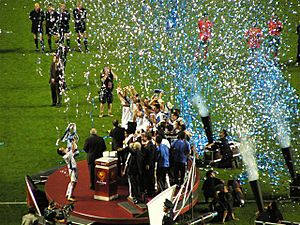
Regional Competitions
- Mediterranean Games
- Gold medals: 1951, 1991
- Third place: 1997
- Mediterranean Cup
- Runners-up: 1950–53
- Balkan Cup
- Runners-up: 1934–35
- Third place: 1929–31, 1935, 1936
Friendly Tournaments
- Cyprus International Football Tournament
- Champions: 1999, 2006
Awards and Honors
- Laureus World Team of the Year: 2005
- World Soccer Team of the Year: 2004
- FIFA Confederations Cup Fair Play Award: 2005
Summary of Wins
| Competition | Total | |||
|---|---|---|---|---|
| FIFA World Cup | 0 | 0 | 0 | 0 |
| UEFA European Championship | 1 | 0 | 0 | 1 |
| FIFA Confederations Cup | 0 | 0 | 0 | 0 |
| Olympic Games | 0 | 0 | 0 | 0 |
| Total | 1 | 0 | 0 | 1 |
Images for kids
-
The national team for the Inter-Allied Games in Paris, 1919
-
Greece squad for the 1920 Olympics
-
Alketas Panagoulias led Greece to the Euro 1980 and 1994 FIFA World Cup.
-
Greece line-up in Euro 2004
-
Theodoros Zagorakis, captain of the national team and "player of the tournament" in Euro 2004
-
Angelos Charisteas scoring Greece's winning goal in the Euro 2004 final
-
Greece vs Spain in Red Bull Arena during UEFA Euro 2008
-
Greece players singing the Greece national anthem in Euro 2012 opening match against the hosts Poland (1–1)
-
Flag of Greece held by fans
-
The Greece national team at the UEFA Euro 2004 trophy ceremony
-
Manager Otto Rehhagel, under whose guidance Greece were crowned European champions in 2004
See also
 In Spanish: Selección de fútbol de Grecia para niños
In Spanish: Selección de fútbol de Grecia para niños
 | Isaac Myers |
 | D. Hamilton Jackson |
 | A. Philip Randolph |


